Earlier this spring, Minster for Rural and Community Affairs, Heather Humphreys, announced the largest-ever expansion of Ireland’s national Walks Scheme, with 62 new trails added across 17 counties.
Under the initiative – which is designed to boost outdoor recreation and rural tourism – funding is provided to farmers and other landholders to maintain walking trails that pass through their holdings. Over €15m has been paid to farmers and landholders since 2017, with an additional €1.4m spent on materials for the maintenance of trails.
The scheme is operated by the Department of Rural and Community Development in conjunction with local development companies, with expressions of interest (EOIs) now open for new trails/extensions to be considered for inclusion.
But what has the experience been like on the ground?
Tony O’Donnell, sheep farmer
“It’s a real good news story for this area,” says Tony O’Donnell, a sheep farmer based between Newport and Mulranny in Co Mayo, where he keeps approximately 70 ewes, with access to 120 acres of commonage and 20 lowland acres.
This region is also home to the Burrishoole Loop Walks network, a series of walks ranging from 3km to 16km, developed from a pre-existing web of old bog trails and famine-era roads.
Approximately 4,000 metres of the Burrishoole network passes through two of the commonage areas where Tony keeps his sheep, and since 2009, he has been one of approximately 120 local farmers and landowners involved in maintaining these loops as part of the Walks Scheme, which is administered locally by South West Mayo Development Company.
For Tony, “it has been a great experience”.
“Genuinely,” he emphasises. “It fitted in like a glove with our type of farming.”
Tony explains that he and the other farmers work on a rota (i.e. assigned a designated month) where they regularly walk their stretch of the route to ensure it is up to standard. In his case, this mostly involves removing litter – “you might get an occasional fly tipping,” he says. There were also jobs like clearing blocked drains, securing signage or alerting the local recreation officer if there are more extensive structural issues that need addressing.
For this, he receives two payments a year, which in his case, amounts to approximately €1,000 in total. This, he feels, is “vital” in valuing the contribution of local farmers as custodians of the countryside, given that approximately €100,000 is paid out each year to those who maintain the Burrishoole loops.
“It’s a buy-in,” he emphasises. “It embeds the whole Walks Scheme into the community.”
He feels, however, that the benefits of the scheme go far beyond the payments. For instance, facilities such as car parks and improved road surfacing and drainage originally implemented to benefit walkers have proven useful to farmers too.
Tony also values the financial spin-off for the wider community, in terms of tourism. He says that while farmers may have had some concerns originally regarding people walking dogs or obstructing access, the reality is “99.9% of people are always careful” and that he enjoys meeting walkers on the trail.
“They’re interested to know what you’re at,” he explains, “and like everything in rural Ireland, it’s good for your mental health to meet somebody; and for some farmers, they may not meet many people [otherwise].”
Ultimately, Tony feels the Walks Scheme has been “a real good news story for this area”.
“We’re delighted that the roads route is there, that it’s being well maintained and that people are using it; and that we have an input as well,” he says. “We feel pride in what we’re delivering.”
Great spin-off
Martin Dillane is rural recreation officer with South West Mayo Development Company. He currently oversees five recognised walking loops on the scheme, with two additions this spring that are awaiting sign off from Sport Ireland: Kilmaine Loops in the south-east of the county, and Clogher Bog Loops in central Mayo. With expressions of interest (EOIs) currently open until October, he is hoping to get another one to three walks approved in the north of the county by the year-end.
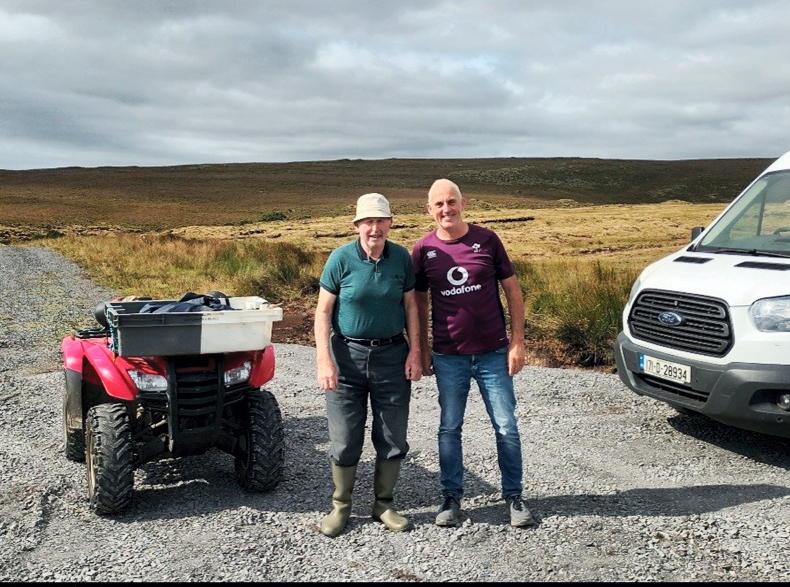
Rural recreation officer Martin Dillane (right) pictured with Tony O’Donnell’s father, Neil, viewing improvements and maintenance carried out under the Walks Scheme materials fund
At present, Martin liaises with approximately 260 farmers/landowners throughout the county under the Walks Scheme. This involves everything from securing agreement regarding access to land in the early stages of a proposed trail, to developing individual work plans, which set out the number of hours of labour required by each participant, for which they receive a “participant payment”. This currently stands at €15.52/hour, with a maximum of 200 hours per trail per participant (see ‘In short’ box for more).
“There needs to be a lot of homework done,” says Martin of the administration involved. “It’s just not something you take a whim and put in for.”
However, he believes that the Walks Scheme has been “really positive” for all.
“There’s a great spin-off in terms of money to the landowner, there’s maintenance carried out on the bog walks, and also the impact on tourism,” he says. “You get a lot of people visiting and spending money in the local economy.”
‘A long ways’ to making farmers feel valued'
Of the 62 new trails added to the scheme this spring, six fall under the auspices of the Fastnet Trails project in west Cork, which was established by the community in 2015, with support from West Cork Development Partnership.
“At some point we’re going to be able to check into a hotel in Skibbereen and walk all the way to Mizen Head,” explains committee chair, Christy Sanders, of their long-term vision.
Originally from the US, with a background in finance, Christy and his wife, Elizabeth, moved to Goleen 15 years ago seeking a change of pace.
“And I’ve ended up becoming a farmer,” laughs Christy, explaining that he and Elizabeth rear black faced mountain sheep and also sell salads locally.
He was originally invited to join the Fastnet Trails committee by a friend, but could see that there was a need to bridge the gap between those who farm the land and those who use it for recreation i.e. relating how an acquaintance from an urban area thought nothing of walking her dog where sheep grazed .
“There’s a lot of room for misunderstanding,” he notes. “It becomes a bit problematic because the farmers have really got no incentive to allow people onto their land: and you’ve got to be awfully public-spirited to engage in that without some kind of structure.”
Having been accepted onto the Walks Scheme, however, West Cork
Development Partnership are in the early stages of liaising with local farmers/landowners who will be eligible for payment. Christy believes this will go “a long ways” towards making farmers feel valued.
“Being able to pay people for the maintenance that they do on the extent of the trail that goes through their property is really kind of an essential pre-condition, I think, to making people understand that it’s OK – and that it’s worth their time; and that they can be more involved themselves,” he says.
What’s needed to be eligible for consideration as a Walks Scheme trail
• The entire length of the trail must be defined
• The trail must be available to the public
• The trail must be listed on the National Trails Register, which is maintained by Sport Ireland Outdoors
• There must be a clear agreement (in writing) from all landholders along the entire route that they are willing to allow access to recreational users and are willing to participate in the scheme
• Extensive engagement with communities and trail management organisations must have taken place
• All trails which are approved to join the Walks Scheme are listed on the National Trails Register and are therefore, covered by a public liability policy, which is managed by Sport Ireland Outdoors
• The Department is now inviting expressions of interest for new trails and substantial extensions to existing trails. Potential applicants (e.g. trail management committees, community groups, local authorities etc) should be advised that expressions of interest must be made through local development companies in respect of trails that are eligible for inclusion in the scheme. The closing date for EOIs is 11 October, 2024.
• A list of walks on the scheme can be found at gov.ie/en/publication/af6a41-walks-scheme-walks-and-trails
In short
• Launched in 2008, there are over 140 nationally recognised trails registered with the Walks Scheme
• Scheme participants enter into an agreement to deliver the scheme for a period of five years, and receive a payment for their work on the development, enhancement and maintenance work as set out in their agreed “work plan”
• This currently stands at €15.52/hour, with a maximum of 200 hours per trail per participant
• On entering the scheme, participants receive 50% of the approved annual payment in advance, with the balance paid six months later.
Earlier this spring, Minster for Rural and Community Affairs, Heather Humphreys, announced the largest-ever expansion of Ireland’s national Walks Scheme, with 62 new trails added across 17 counties.
Under the initiative – which is designed to boost outdoor recreation and rural tourism – funding is provided to farmers and other landholders to maintain walking trails that pass through their holdings. Over €15m has been paid to farmers and landholders since 2017, with an additional €1.4m spent on materials for the maintenance of trails.
The scheme is operated by the Department of Rural and Community Development in conjunction with local development companies, with expressions of interest (EOIs) now open for new trails/extensions to be considered for inclusion.
But what has the experience been like on the ground?
Tony O’Donnell, sheep farmer
“It’s a real good news story for this area,” says Tony O’Donnell, a sheep farmer based between Newport and Mulranny in Co Mayo, where he keeps approximately 70 ewes, with access to 120 acres of commonage and 20 lowland acres.
This region is also home to the Burrishoole Loop Walks network, a series of walks ranging from 3km to 16km, developed from a pre-existing web of old bog trails and famine-era roads.
Approximately 4,000 metres of the Burrishoole network passes through two of the commonage areas where Tony keeps his sheep, and since 2009, he has been one of approximately 120 local farmers and landowners involved in maintaining these loops as part of the Walks Scheme, which is administered locally by South West Mayo Development Company.
For Tony, “it has been a great experience”.
“Genuinely,” he emphasises. “It fitted in like a glove with our type of farming.”
Tony explains that he and the other farmers work on a rota (i.e. assigned a designated month) where they regularly walk their stretch of the route to ensure it is up to standard. In his case, this mostly involves removing litter – “you might get an occasional fly tipping,” he says. There were also jobs like clearing blocked drains, securing signage or alerting the local recreation officer if there are more extensive structural issues that need addressing.
For this, he receives two payments a year, which in his case, amounts to approximately €1,000 in total. This, he feels, is “vital” in valuing the contribution of local farmers as custodians of the countryside, given that approximately €100,000 is paid out each year to those who maintain the Burrishoole loops.
“It’s a buy-in,” he emphasises. “It embeds the whole Walks Scheme into the community.”
He feels, however, that the benefits of the scheme go far beyond the payments. For instance, facilities such as car parks and improved road surfacing and drainage originally implemented to benefit walkers have proven useful to farmers too.
Tony also values the financial spin-off for the wider community, in terms of tourism. He says that while farmers may have had some concerns originally regarding people walking dogs or obstructing access, the reality is “99.9% of people are always careful” and that he enjoys meeting walkers on the trail.
“They’re interested to know what you’re at,” he explains, “and like everything in rural Ireland, it’s good for your mental health to meet somebody; and for some farmers, they may not meet many people [otherwise].”
Ultimately, Tony feels the Walks Scheme has been “a real good news story for this area”.
“We’re delighted that the roads route is there, that it’s being well maintained and that people are using it; and that we have an input as well,” he says. “We feel pride in what we’re delivering.”
Great spin-off
Martin Dillane is rural recreation officer with South West Mayo Development Company. He currently oversees five recognised walking loops on the scheme, with two additions this spring that are awaiting sign off from Sport Ireland: Kilmaine Loops in the south-east of the county, and Clogher Bog Loops in central Mayo. With expressions of interest (EOIs) currently open until October, he is hoping to get another one to three walks approved in the north of the county by the year-end.

Rural recreation officer Martin Dillane (right) pictured with Tony O’Donnell’s father, Neil, viewing improvements and maintenance carried out under the Walks Scheme materials fund
At present, Martin liaises with approximately 260 farmers/landowners throughout the county under the Walks Scheme. This involves everything from securing agreement regarding access to land in the early stages of a proposed trail, to developing individual work plans, which set out the number of hours of labour required by each participant, for which they receive a “participant payment”. This currently stands at €15.52/hour, with a maximum of 200 hours per trail per participant (see ‘In short’ box for more).
“There needs to be a lot of homework done,” says Martin of the administration involved. “It’s just not something you take a whim and put in for.”
However, he believes that the Walks Scheme has been “really positive” for all.
“There’s a great spin-off in terms of money to the landowner, there’s maintenance carried out on the bog walks, and also the impact on tourism,” he says. “You get a lot of people visiting and spending money in the local economy.”
‘A long ways’ to making farmers feel valued'
Of the 62 new trails added to the scheme this spring, six fall under the auspices of the Fastnet Trails project in west Cork, which was established by the community in 2015, with support from West Cork Development Partnership.
“At some point we’re going to be able to check into a hotel in Skibbereen and walk all the way to Mizen Head,” explains committee chair, Christy Sanders, of their long-term vision.
Originally from the US, with a background in finance, Christy and his wife, Elizabeth, moved to Goleen 15 years ago seeking a change of pace.
“And I’ve ended up becoming a farmer,” laughs Christy, explaining that he and Elizabeth rear black faced mountain sheep and also sell salads locally.
He was originally invited to join the Fastnet Trails committee by a friend, but could see that there was a need to bridge the gap between those who farm the land and those who use it for recreation i.e. relating how an acquaintance from an urban area thought nothing of walking her dog where sheep grazed .
“There’s a lot of room for misunderstanding,” he notes. “It becomes a bit problematic because the farmers have really got no incentive to allow people onto their land: and you’ve got to be awfully public-spirited to engage in that without some kind of structure.”
Having been accepted onto the Walks Scheme, however, West Cork
Development Partnership are in the early stages of liaising with local farmers/landowners who will be eligible for payment. Christy believes this will go “a long ways” towards making farmers feel valued.
“Being able to pay people for the maintenance that they do on the extent of the trail that goes through their property is really kind of an essential pre-condition, I think, to making people understand that it’s OK – and that it’s worth their time; and that they can be more involved themselves,” he says.
What’s needed to be eligible for consideration as a Walks Scheme trail
• The entire length of the trail must be defined
• The trail must be available to the public
• The trail must be listed on the National Trails Register, which is maintained by Sport Ireland Outdoors
• There must be a clear agreement (in writing) from all landholders along the entire route that they are willing to allow access to recreational users and are willing to participate in the scheme
• Extensive engagement with communities and trail management organisations must have taken place
• All trails which are approved to join the Walks Scheme are listed on the National Trails Register and are therefore, covered by a public liability policy, which is managed by Sport Ireland Outdoors
• The Department is now inviting expressions of interest for new trails and substantial extensions to existing trails. Potential applicants (e.g. trail management committees, community groups, local authorities etc) should be advised that expressions of interest must be made through local development companies in respect of trails that are eligible for inclusion in the scheme. The closing date for EOIs is 11 October, 2024.
• A list of walks on the scheme can be found at gov.ie/en/publication/af6a41-walks-scheme-walks-and-trails
In short
• Launched in 2008, there are over 140 nationally recognised trails registered with the Walks Scheme
• Scheme participants enter into an agreement to deliver the scheme for a period of five years, and receive a payment for their work on the development, enhancement and maintenance work as set out in their agreed “work plan”
• This currently stands at €15.52/hour, with a maximum of 200 hours per trail per participant
• On entering the scheme, participants receive 50% of the approved annual payment in advance, with the balance paid six months later.






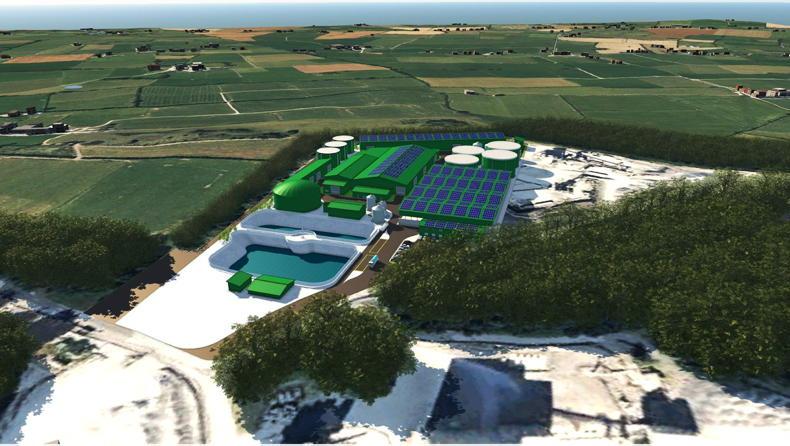

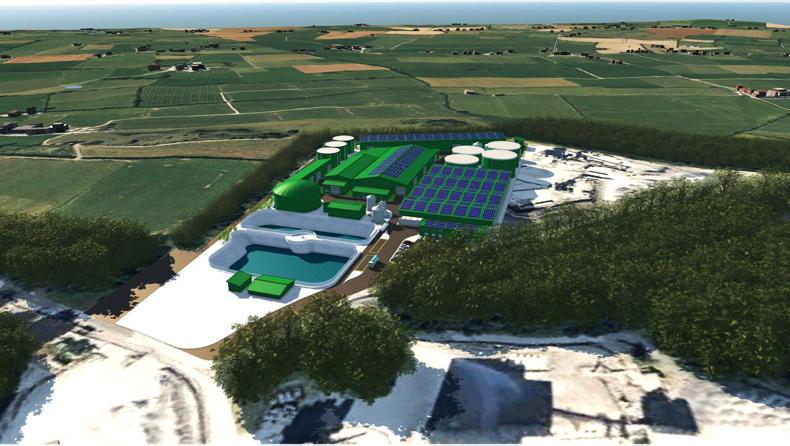
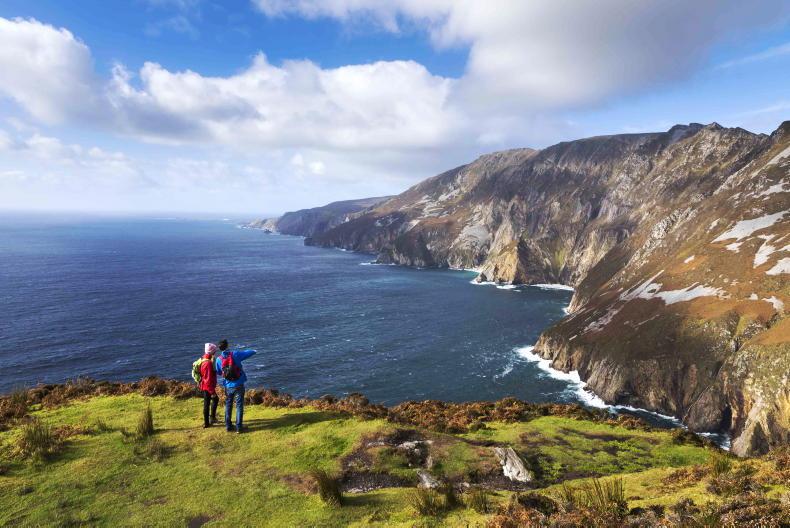
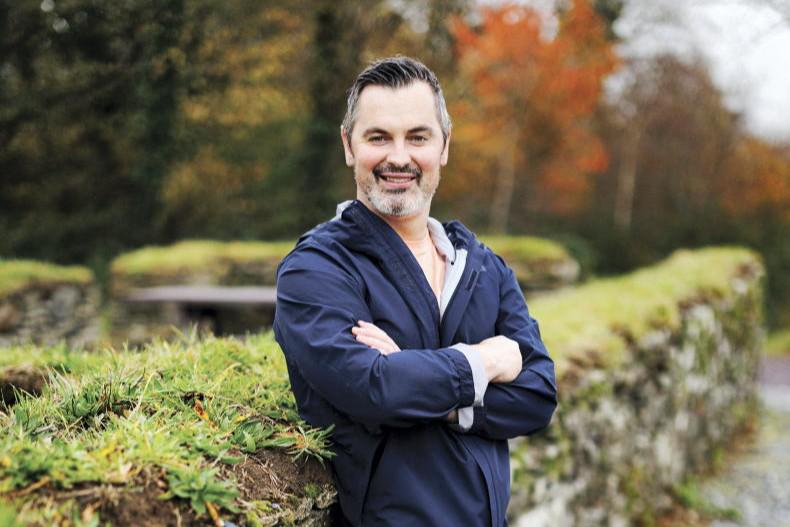
SHARING OPTIONS